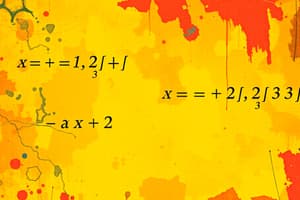Podcast
Questions and Answers
What is an algebraic proof?
What is an algebraic proof?
- A proof based on a single statement
- A proof using visual diagrams
- A proof containing statements and reasons organized into two columns
- A proof made up of a series of algebraic statements (correct)
What is an axiom?
What is an axiom?
A statement that is accepted as true without proof.
Define a compound statement.
Define a compound statement.
A statement formed by joining two or more statements.
What is the conclusion in a conditional statement?
What is the conclusion in a conditional statement?
What characterizes a conditional statement?
What characterizes a conditional statement?
What is a conjecture?
What is a conjecture?
Define contrapositive.
Define contrapositive.
What is the converse of a conditional statement?
What is the converse of a conditional statement?
What is a counterexample?
What is a counterexample?
Define deductive argument.
Define deductive argument.
What does deductive reasoning employ?
What does deductive reasoning employ?
What is disjunction?
What is disjunction?
What is a formal proof?
What is a formal proof?
What is the hypothesis in a conditional statement?
What is the hypothesis in a conditional statement?
Define conjunction.
Define conjunction.
What is an if-then statement?
What is an if-then statement?
What does inductive reasoning involve?
What does inductive reasoning involve?
Define informal proof.
Define informal proof.
What is the inverse of a conditional statement?
What is the inverse of a conditional statement?
What does it mean for statements to be logically equivalent?
What does it mean for statements to be logically equivalent?
Define negation.
Define negation.
What is a paragraph proof?
What is a paragraph proof?
What is a postulate?
What is a postulate?
What is a proof?
What is a proof?
What are related conditionals?
What are related conditionals?
What is a statement?
What is a statement?
What is a theorem?
What is a theorem?
Define truth table.
Define truth table.
What does truth value refer to?
What does truth value refer to?
What is a two-column proof?
What is a two-column proof?
Flashcards are hidden until you start studying
Study Notes
Algebraic Proof and Definitions
- Algebraic Proof: Composed of algebraic statements justified by properties of equality, integral for proving mathematical statements.
- Axiom: A universally accepted truth, not requiring proof, serves as a foundation in mathematics.
- Compound Statement: Created by merging two or more individual statements, expanding logical discourse.
Conditional Statements
- Conclusion: The part of a conditional statement that comes after "then," crucial for understanding implications.
- Conditional Statement: Formatted as "if-then," representing foundational logical assertions in reasoning.
- Hypothesis: The initial part of a conditional statement following "if," stating the assumption.
Logical Relationships and Reasoning
- Conjecture: An informed guess derived from existing information, initiating further inquiry and proof.
- Contrapositive: Formed by negating both parts of the converse of a conditional statement, often used in proofs.
- Converse: Created by swapping the hypothesis and conclusion in a conditional statement, altering its implication.
Proof Methods
- Counterexample: Critical in refuting universal claims by demonstrating a specific instance where the statement fails.
- Deductive Argument: A structured proof utilizing logical steps to arrive at a solution or assertion, showcasing mathematical rigor.
- Deductive Reasoning: Employs established facts and definitions to derive logical conclusions, ensuring strong argument validity.
Types of Proofs
- Disjunction: A compound statement united by "or," facilitating multiple scenarios in logical discussions.
- Formal Proof: Two-column proofs delineating statements and corresponding reasons, emphasizing clarity and structure.
- Informal Proof: A less rigid paragraph format used for explaining proofs in a narrative style.
- Paragraph Proof: A more descriptive form of informal proof, elaborating on why a conjecture is valid in contextual situations.
Logical Operators and Relations
- Inverse: Negates both the hypothesis and conclusion of a conditional statement, providing alternate reasoning pathways.
- Logically Equivalent: Statements that maintain identical truth values, a cornerstone in logical analysis.
- Negation: The opposite of a statement, defined as "not p" if the original statement is represented by p.
Fundamental Elements of Mathematics
- Postulate: Essential truths about geometry accepted without proof, serving as building blocks for further reasoning.
- Proof: A logical framework that substantiates each assertion with accepted truths, forming the backbone of mathematical theory.
- Related Conditionals: Linked statements based on a given conditional, broadening the logical implications of the initial assertion.
Additional Concepts
- Statement: Any declarative sentence that can objectively be classified as true or false, forming the basis of logical expression.
- Theorem: A proven statement or conjecture, established through rigorous definitions, axioms, and logical deductions.
- Truth Table: A systematic representation of the truth values of statements, useful for evaluating logical expressions.
- Truth Value: The classification of a statement as either true or false, essential for validating logical assertions.
- Two-Column Proof: A formalized structure showcasing statements alongside their justifications, emphasizing clarity in mathematical reasoning.
Studying That Suits You
Use AI to generate personalized quizzes and flashcards to suit your learning preferences.




